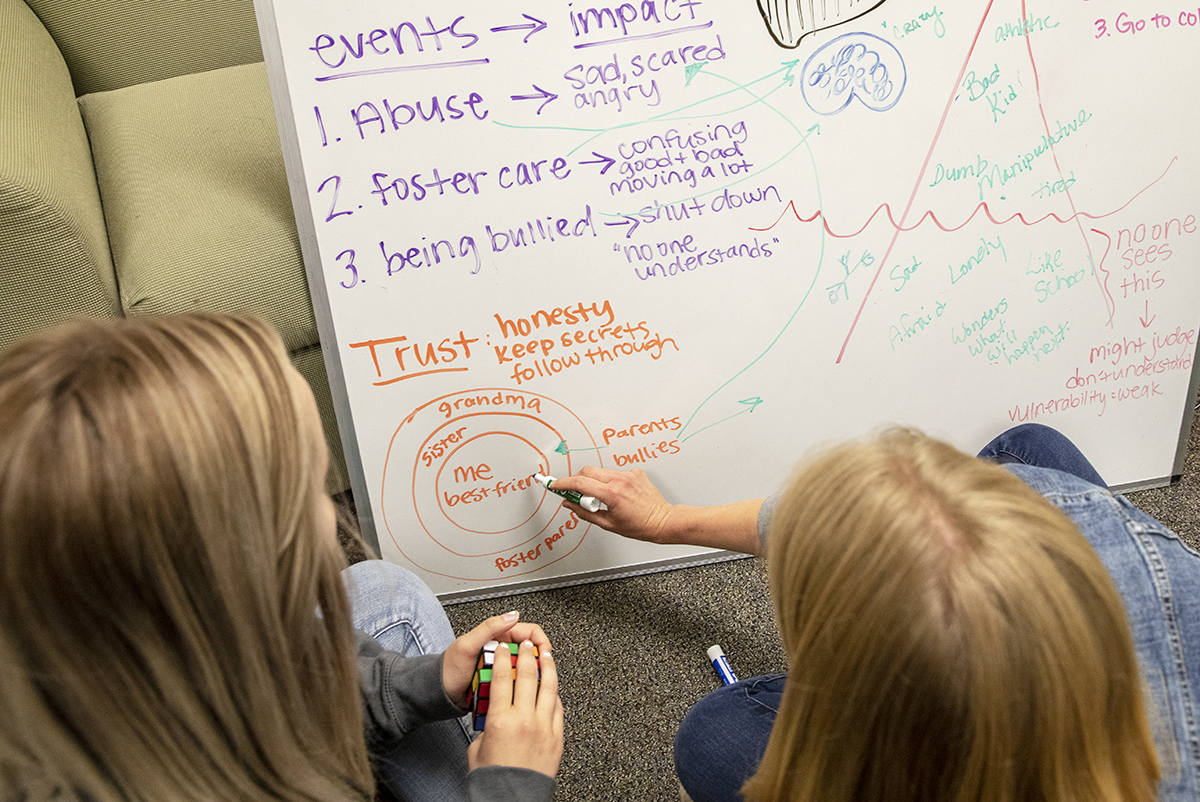
Youth who are at risk for involvement in the juvenile justice system often have trauma in their personal or family experiences. By training human service professionals and caregivers in trauma-informed approaches, Colorado State University’s Trauma and Resilience Assessment Center, or CTRAC, part of the Department of Human Development and Family Studies, has created a community of support for these youth – and has secured a federal grant of up to $1.6 million over four years to continue its impactful work.

“Childhood trauma is associated with higher levels of post-traumatic stress, deficits in regulation, and poorer experiences in school, all of which can contribute to higher risk of delinquent behavior,” explained Stephanie Seng, M.S., LMFT, director of CTRAC.
“When a youth’s involvement in the juvenile justice system escalates, risk for additional trauma exposure, separation from support systems, and obstacles to treatment increase. These risk factors highlight the need for coordination and provision of trauma-informed services.”
Project JUSTIS
The new grant is supporting the Juvenile Justice Trauma Informed Systems Project (Project JUSTIS) in CTRAC and aims to increase the capacity and expand delivery of trauma screening, assessment, and treatment for youth aged 8-18 in Larimer and Denver counties at risk for juvenile justice system involvement. The project also trains local professionals in trauma-informed care principles and strives to improve family well-being.
“Unsurprisingly, youth in the juvenile justice system have higher trauma exposure than their peers. Project JUSTIS aims to reduce entry into the system and recidivism by increasing access to trauma-informed screening, services, and systems,” said Seng.
Rooted in resilience
CTRAC was formed through a prior grant from the U.S. Department of Human Services Substance Abuse and Mental Health Services Administration (SAMHSA) that was awarded to a seven-county consortium of human service departments led by Larimer County.

“The grant successfully achieved several goals including reducing youth placement in congregate care and building a trauma-informed community to support youth and families.” Seng and the CTRAC team, including CK Rizzo, Shawn Whitney, Chelsea Kline, and Candice Chavez, established an effective multi-pronged approach to addressing the impacts of trauma.
First, CTRAC provides resilience-based trauma assessments to youth and caregivers to help them understand the impact of complex trauma on an individual’s development and well-being. The assessments help each person identify, understand, and value their own strengths and resources. With this foundation in place, CTRAC offers recommendations to support youth and caregivers as they respond to and heal from trauma.

Additionally, CTRAC amplifies the resilience-based approach through training and consultation for caregivers, agencies, and organizations serving youth and families. The training advances professional skills for frontline service providers and caregivers through practical tools and workshops, including support for the secondary trauma some may experience in their work.
Training partners in the child welfare system on trauma-informed, resilience-based approaches creates a common understanding and language around trauma so the various agencies supporting families can be more consistent, collaborative, creative, and compassionate. Since 2017, CTRAC has trained professionals from more than 30 different organizations including health and human service agencies, schools, criminal justice offices, mental health centers, residential treatment facilities, medical centers, and non-profit organizations.
Larimer County Department of Human Services recognized CTRAC with the Jim Drendel Community is the Solution Award in 2018, acknowledging the center’s early impact. The COVID-19 pandemic brought new challenges, but CTRAC modeled the resilience it teaches by shifting all therapy and assessment activities to telehealth formats and training to live webinars. The center was recognized for its agility by CSU’s Employee Appreciation Board in May 2021.
Preparing practitioners
“The work CTRAC has done in partnership with our local agencies exemplifies how these relationships are both mutually beneficial and extremely valuable for the community,” said Brock Rigsby, who completed a clinical internship with CTRAC as part of his master’s in marriage and family therapy.

CTRAC – housed in CSU’s Department of Human Development and Family Studies – is also fostering the next generation of trauma-informed, resilience-based professionals. Graduate students in the Marriage and Family Therapy Program support CTRAC clients as part of their practicum and internship experiences in the Center for Family and Couple Therapy.
“Trauma is important to understand and treat,” said Rigsby. “The focus CTRAC places on resilience—from the moment of first contact to the review meeting—is critical in a way I didn’t fully understand or appreciate prior to my rotation there. I think of CTRAC as one of the most impactful experiences I have had or will have in my training as a clinician and family scientist.”
Focus for the future

As the prior SAMHSA grant came to a close in 2021, the CTRAC team regrouped. “We decided to apply for the next grant cycle, continuing the great work we were doing, but narrowing the focus from child welfare to a more specific emphasis on juvenile justice,” said Rizzo, CTRAC’s assistant director for operations and outreach, who led the grant application.
The Project JUSTIS grant also refined the geographic scope from seven counties to two. Denver and Larimer Counties are home to a combined 90,000 of Colorado’s youth and together addressed close to 5,000 juvenile justice charges between 2017-2019. CTRAC offers support to Larimer County residents through its Fort Collins campus location in the Gifford Building and in Denver through the CSU Spur satellite office. “The risk factors for re-traumatization are particularly salient for youth of color who are overrepresented in stricter levels of sentencing and detainment in both Larimer and Denver counties,” Rizzo said.
“Our big picture goal is to extend the availability of our services beyond youth with open cases at DHS to any youth at risk of involvement in juvenile justice,” Seng explained. “We also hope to expand our capacity to provide not only assessment and training but evidence-based trauma treatment.”
Making connections, making sense
Quotes from CTRAC assessment and training participants:
- “[The most important takeaway was] being able to share my story, make connections, and see it all written down. It helped me make sense of what is going on in my brain. I could let it out and not hold it all in.” – Adolescent client who completed an assessment at CTRAC
- “We work with people experiencing trauma every day,” said one training participant. “Learning how to better understand where they’re coming from is key to working alongside them rather than at them.” – Training participant
- “This was so helpful and gives me strategies and tools to use with the boys and respond in a more gentle and helpful way. This is awesome. Thank you.” – Caregiver
- “It’s one of the coolest experiences gaining so much insight into how we can best help kiddos and the science/research behind trauma is fascinating. It’s so important that we have access to your trauma assessments!” – Larimer County Department of Human Services caseworker
The Department of Human Development and Family Studies is a part of CSU’s College of Health and Human Sciences.